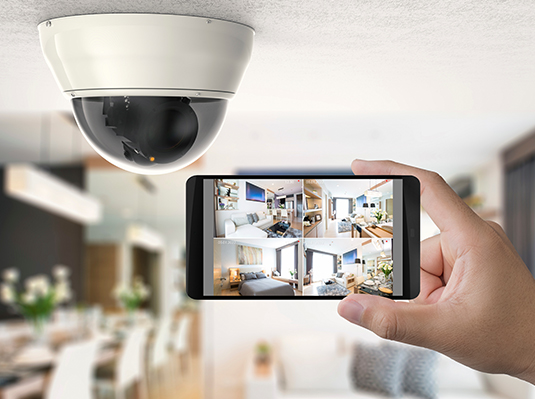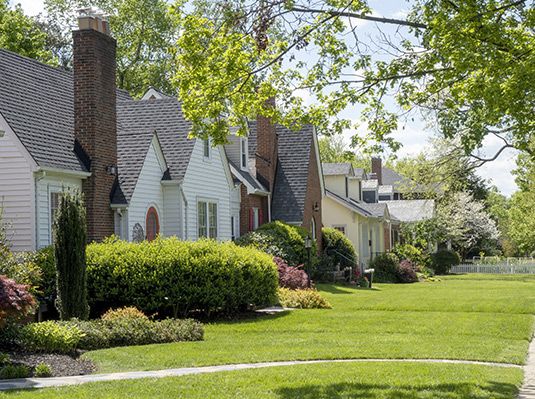
What is a security system?
A security system in the simplest terms is a series of electronics that work together to protect your home from burglars or other potential home dangers. Most systems monitor entrances to the home with sensors on doors, windows, and other entry points to the home. Some are even equipped with cameras and motion sensors on the interior or exterior of the home. You have probably heard of brands like SimpliSafe, Ring, Vivint, and ADT, but regardless of the brand you use, insurance companies are going to reward you for having one for your home.
What kinds are available?
Home insurance companies will give you a discount based on the type of system. The two general categories that security systems will fall into are local and central alarms. So what’s the difference? Why does it even matter? Below, we will dive into these different systems, the impacts they have on your everyday life, and your home insurance premium.
Local System
-
A local security system is a more “basic” option when it comes to home security. Many homes, and some smaller businesses, have local alarm systems installed. These systems operate by notifying the person listed on the account that the alarm system has been tripped. They will sound an alarm, and depending on the system, will either send a notification to your device or have an automated call sent to your phone.
-
While they tend to be very affordable, local security systems are not capable of notifying the authorities when the alarm is triggered so it is completely up to the person notified of the breach to call the police station. If the person named on the account is away from their phone or unable to be reached, the alarm will continue to sound until it is manually disabled. This could be harmful to any pets or children in the home that are unable to disable the system.
- A local system can be installed for an upfront cost of about $100 to $400 and requires no payment beyond that. Many alarm companies will offer this local option as their basic package, then offer the following system, a central system, as an upgrade. As far as discounts on your insurance policy, home insurance companies will give a small discount, around 2% to 5%, for these local systems.
Central System
-
A step up from the basic system, a central-monitored alarm works by monitoring your home with electronics and will still inform the homeowner or whoever is named on the account of any potential breaches. The added benefit of a central system is that the alarm also reports to an alarm-monitoring entity that will contact the account owner to confirm if it’s a false alarm or an actual security breach. If it is a true emergency, that monitoring system will then contact the appropriate authorities to take action. However, if it’s a false alarm, the monitoring company assists in shutting off the alarm.
-
Most security experts recommend central systems over local ones because authorities can act more quickly, and if property owners are unable to be contacted, someone will be sent to their home to check out the situation. Home insurance companies also see the benefits of a central security system and will often give a larger discount for these, up to 15%. Like with any package upgrade, there is an upfront setup cost for central systems that is about the same as a local system, and an additional monitoring subscription that is generally between the $20-$100 mark but can be up to $400 depending on the complexity of the system and size of the home.
Home Insurance Alarm System Discount
Insurance carriers discount their premiums for properties with security systems for several reasons, all mainly stemming from the reduction of potential claims. Security systems protect the valuables that you have in the home, like jewelry and electronics. Having a system that is visible from the exterior of the home may deter crime in the first place, preventing any damage or trespassing from ever occurring. Since many systems are “smart” and connected with your phone and other devices, they allow you as the owner to be connected and in tune with what’s going on at your property even when you’re not there. Many also see the benefit in additional services these alarm companies offer like fire and carbon monoxide detection. The safer you can make your house, the more you reduce your risk for a loss and claim, so the less the insurance company must pay for your losses. You get rewarded with a small discount and the added benefit of not having to make a claim and have your rates increase in the future because of those claims.
So, let’s say you’ve decided you want to move forward with installing a security system or you already have a system and want the discount to be applied to your policy – what’s next? Insurance companies will want proof that you did have the system installed and that it’s active so they will request a certificate of installation or proof of alarm. You should have gotten one when the system was set up but if you can’t seem to find it, no worries, you can simply request it from the company to send you a copy. Then you can contact your agent to send proof to the company and receive the discount! Depending on the date of installation, you can potentially receive a prorated discount for the remainder of the policy.
If you are looking for an additional way to protect your family and stay connected to your home while you are away, a security system is a great investment. Make sure your insurance company knows that you have one so you can capitalize on all available discounts!
The contents of this article are for informational purposes only. You should not act or refrain from acting based on this information without first consulting a Goosehead licensed agent at [email protected]. We disclaim all liability for actions taken or not taken by you based on the contents of this article which is provided "as is." Goosehead makes no representation that this content is error-free.


